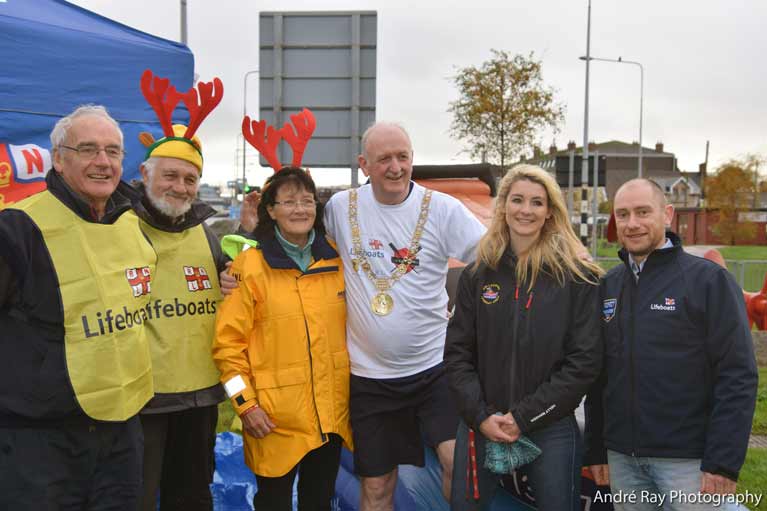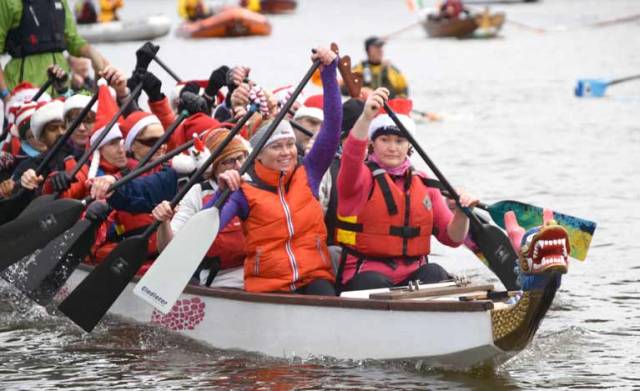The “All In A Row 2018” event on the capital’s River Liffey was supported by teams rowing 40 boats including skiffs, kayaks, canoes and currachs to exceed a 1,000km in eight hours, raising €12,000 for these charities.
Starting from St. Patrick’s Rowing Club at the Tom Clarke Bridge (formerly the East Link Bridge) and finishing at the Ha’penny Bridge, the Liffey was busy with lots of rowing crews, kayaks, canoes and currachs.
 The Howth RNLI Lifeboat Fund Raising Team with Lord Mayor Nial Ring
The Howth RNLI Lifeboat Fund Raising Team with Lord Mayor Nial Ring
Lord Mayor Nial Ring joined a crew on one of the skiffs for the December event and completed his turn in style.
The challenge was undertaken with the aim of showcasing the River Liffey as one of Dublin’s best amenities while raising funds for the water-related charities, the RNLI and the Irish Underwater Search and Recovery Unit.
A wreath-laying ceremony by the Lord Mayor of Dublin, Nial Ring, took place to commemorate all those who have lost their lives through drowning. Pat O’Connor, Trumpeter with the Communication Workers Union Brass Band played the Last Post on the Sean O’Casey Bridge.
The RNLI Howth Lifeboat Education Team delivered the RNLI Respect The Water message to 350 pupils from city schools, and the pupils visited the Atlantic 85 lifeboat which was berthed alongside the Jeanie Johnston replica famine ship.
 Competitors row their boats on the River Liffey
Competitors row their boats on the River Liffey
Many Dublin rowing clubs have their home on the River Liffey and are a regular sight on the water. At the port end of the river is St. Patrick’s Rowing Club, Stella Maris Rowing Club, Dublin Currach Rowers Union, East Wall Water Sports Group and Poolbeg Yacht and Boat club. Ringsend Basin is home to the
Plurabelle Paddlers (dragon boats) and the Dublin Viking Dragon boats.
At the other end of the city beyond Heuston Station, there are many river rowing clubs and kayaking clubs, including Phoenix Rowing Club.
Commenting on the event, the All In a Row Crew said, ‘Everyone knows the River Liffey but most people don’t know how far it stretches and how many rowing groups use it regularly. There is a vibrant boating community on the River Liffey and these clubs regard it as the living artery of the city and one of Dublin’s
great and undervalued amenities.’
‘After the beautiful summer we’ve had, we know that people are drawn to the water, whether on the coast or inland to enjoy different water sports. The Liffey is an undervalued and underused resource that is right under people’s noses and we want to encourage them to use it and to use it safely. From school children
right up to seasoned rowers, this is a great opportunity to draw people down to the Liffey and learn about water safety and the fun activities they can do on the water all year round.’
Crew, supporters and sponsors raised through the GoFundMe page a fantastic €12,000 to be divided between RNLI Lifeboat Howth and the Irish Underwater Search and Recovery Unit.































































